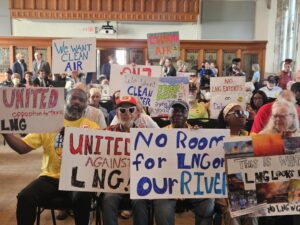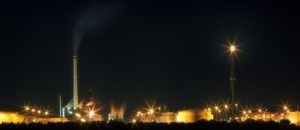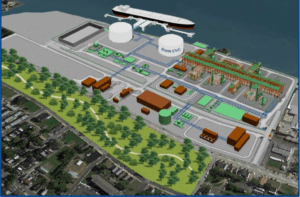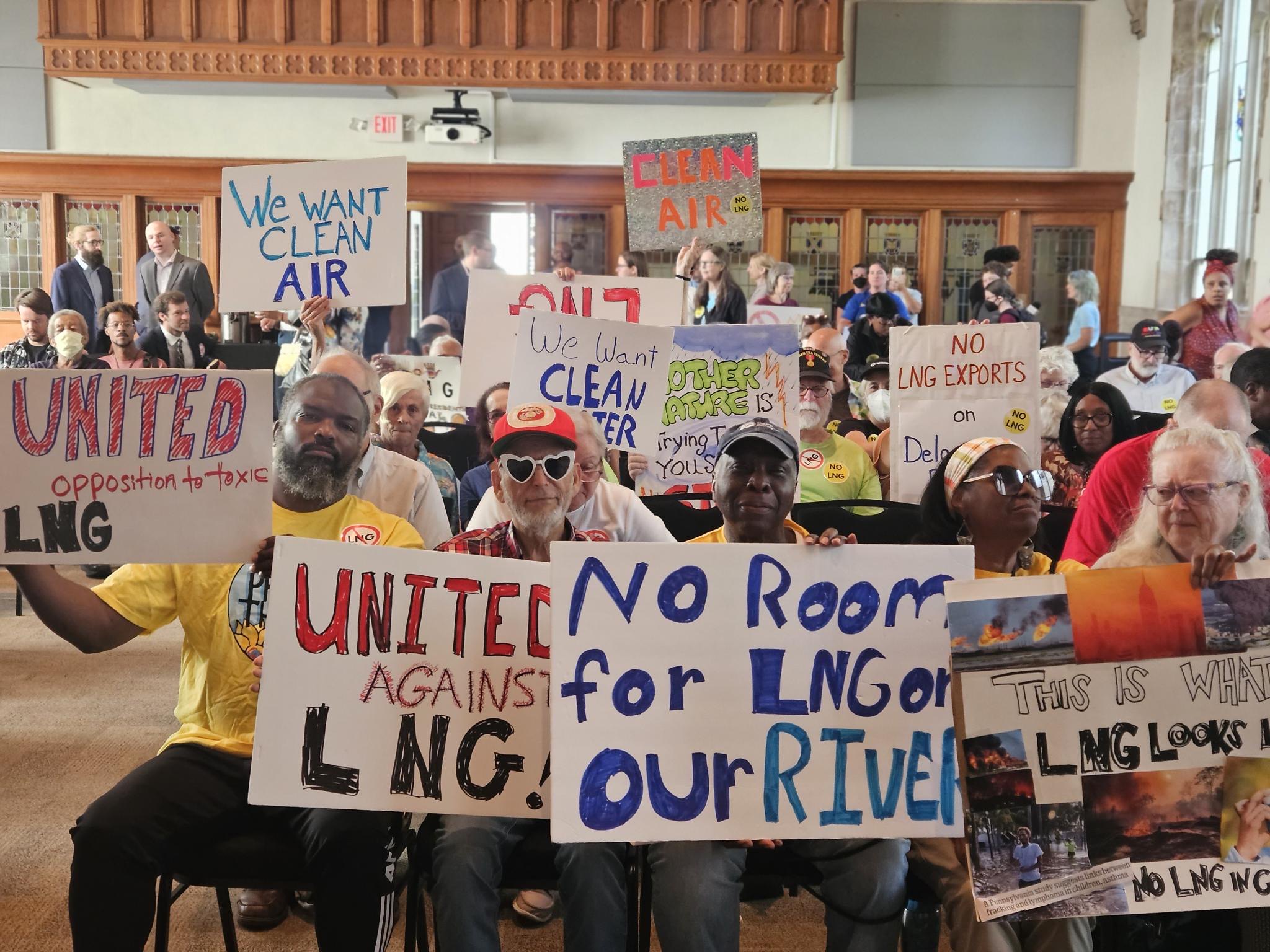
WASHINGTON D.C. (December 17, 2024) – Today, the U.S. Department of Energy (DOE) released its public interest determination analysis, which will provide a framework for evaluating new and pending permits for exporting liquified natural gas (LNG) to countries without a free trade agreement with the United States. This announcement comes nearly a year after President Biden paused permitting decisions for LNG export facilities, which chill fracked gas for storage and transportation to other countries overseas.
The analysis found that continued LNG exports are unsustainable and unadvisable. Notably, the new analysis paints a clear picture of the environmental justice, climate, and economic harms of widespread LNG exports. LNG export terminals are concentrated in communities already burdened by highly-polluting industries, and the buildout of new LNG export facilities will only exacerbate these impacts. LNG exports will also worsen climate change through increasing greenhouse gas emissions from upstream gas production and likely offsetting the development of clean, renewable energy worldwide. Furthermore, unchecked growth of LNG exports will drive up energy costs for residential and commercial consumers while generating profits for the fossil fuel industry. The analysis found flattening international demand for LNG, with most new demand expected to be from China.
Alex Bomstein, Executive Director of Clean Air Council, issued the following statement:
“This report should end the discussion: LNG exports are bad for our pocketbooks, bad for the air we breathe, and bad for the safety of our communities. Energy independence does not mean shipping America’s resources overseas, it means harnessing and storing our abundant solar and wind energy. Clean Air Council urges the DOE to apply the study’s findings and deny the six pending permits for LNG export facilities.”
The findings from this analysis will inform future LNG export authorization decisions by the DOE and hold proposed projects to the strongest-to-date commonsense standards for determining the public impacts of LNG exports. Moreover, the study provides an important factual basis for arguments to deny permits for unlawful LNG export terminal proposals. The new analysis will replace the economic and environmental analyses used by the DOE for application decisions, which were published in 2018 and 2019, respectively.

WYALUSING, Pa. — Late Friday, in response to data requests from the Federal Energy Regulatory Commission (FERC), Delaware River Partners and Bradford County Real Estate Partners confirmed that they do not intend to cancel their Wyalusing liquefaction facility and Gibbstown export facility, despite the U.S. Department of Transportation decision last September to suspend authorization to transport LNG by rail car. The Wyalusing and Gibbstown facilities are part of a logistically and financially connected LNG export project contemplated by New Fortress Energy.
If constructed, the Fortress LNG export project will transport explosive LNG by truck, including through the densely-populated, environmental justice communities in eastern Pennsylvania and western New Jersey between Wyalusing, PA and Gibbstown, NJ for export overseas. The Wyalusing liquefaction facility will emit more than a million tons of climate-polluting greenhouse gases and hundreds of tons of toxic air pollutants each year.
The Sierra Club, Clean Air Council, and PennFuture successfully sued to halt construction on the Wyalusing facility in March 2022. Later that year, the Sierra Club and Natural Resources Defense Council filed a petition for a declaratory order urging FERC to exercise oversight over the Fortress LNG export project.
In response, the Sierra Club, Clean Air Council, and PennFuture issued the following statements:
“By continuing to pursue this dangerous LNG export project, Delaware River Partners, Bradford County Real Estate Partners, and New Fortress Energy are putting the lives of millions of Pennsylvanians and New Jerseyans at risk,” said Patrick Grenter, Sierra Club Beyond Dirty Fuels Campaign director. “The last thing we need is even more dangerous methane gas extracted from Pennsylvania, shipped through our communities by truck, and exported overseas — all while residents face worsening illnesses, higher healthcare costs, and increased energy bills caused by gas exports. This decision is unnecessary and reckless, and the Sierra Club is prepared to continue fighting this project until it is officially canceled.”
“The proposed scheme to make liquified natural gas in Northern Pennsylvania, ship it through our communities for hundreds of miles, and then export it to overseas markets from a facility on the shore of the Delaware River is absurd at best and deadly at worst,” adds Abigail M. Jones, Vice President of Legal and Policy at PennFuture. “Despite continued losses that prove just how unworkable this scheme is, these companies are now doubling down on a plan to deliver highly explosive LNG through some of Pennsylvania’s most vulnerable communities via trucks. Pennsylvanians will not benefit from this plan. We do not need more fossil fuel development; we need to focus our economic development priorities on the future: clean, renewable energy and green, sustainable industries.”
“The Wyalusing and Gibbstown LNG facilities promise to lock us into dirty air and millions of tons of climate-heating pollution for decades while raising energy prices at home,” said Alex Bomstein, Clean Air Council Executive Director. “This ill-conceived proposal has no place in our Pennsylvania and New Jersey communities. We will never stop fighting these dirty and dangerous LNG facilities.”

PHILADELPHIA, PA (November 3, 2023) – The Philadelphia LNG Export Task Force approved a report on Wednesday that did not address concerns raised by potentially affected residents, stressed economic benefits of building an LNG (liquefied natural gas) export terminal that are not aligned with LNG market predictions, and called for changes in state and federal law to support the LNG industry. The report also failed to address multiple obstacles discussed by Representative Joseph C. Hohenstein, which could render any LNG export terminal in Southeast Pennsylvania legally, technically, and economically infeasible, including the surge in the supply of LNG for export and the anticipated decline in European demand.
In Fall 2022, the Pennsylvania General Assembly voted to form the Philadelphia LNG Export Task Force to address the “existing obstacles, economic feasibility, economic impact and the security necessities” associated with turning the Port of Philadelphia into an LNG export terminal. At the time, the Council, joined by several community and environmental groups, asked that the Task Force include local community members instead of only governmental and industry representatives. The Task Force did not listen to this request. Although a 2016 Penn America report analyzed building an LNG project on the Chester waterfront and the company had engaged in related clandestine discussions with elected officials in Chester and Harrisburg, even some Task Force members were at first unaware they would be primarily evaluating the Chester location rather than focusing solely on Philadelphia.
Chester residents, who have long fought for environmental justice, as their families are sickened by a concentration of polluting industries, have opposed any potential new industrial facility and the overall lack of transparency. Several community leaders were denied the opportunity to speak at the Task Force’s April meeting focused on security concerns. In August, residents showed up in force to a public hearing in Chester to unequivocally state that LNG and other harmful industries were not welcome. They stated that they are unwilling to pay the health cost from increased pollution, endure the risk of catastrophic explosions seen at other facilities, or accept the destruction of over 800 homes and community institutions to build a buffer around the site.
Joseph Otis Minott, Esq., Clean Air Council Executive Director and Chief Counsel, released the following statement:
“Cramming a dangerous LNG export terminal into our Southeastern Pennsylvania riverfront risks the health and safety of many surrounding neighborhoods, and the financial stability of our region.The terminal would lock the region into dirty and outdated fossil fuels for decades, further fueling the climate crisis when we know we need to be cutting climate pollution as much as possible. Simply put, the LNG Task Force Report is gas industry marketing propaganda that is out of touch with the community’s priorities and economic realities. The Council lauds Representative Hohenstein for consistently seeking transparency from the Task Force and championing public input in the conversation.”

